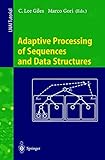Adaptive Processing of Sequences and Data Structures [electronic resource] : International Summer School on Neural Networks “E.R. Caianiello” Vietri sul Mare, Salerno, Italy September 6–13, 1997 Tutorial Lectures / edited by C. Lee Giles, Marco Gori.
Material type: TextSeries: Lecture Notes in Computer Science ; 1387Publisher: Berlin, Heidelberg : Springer Berlin Heidelberg, 1998Description: XIV, 438 p. online resourceContent type: text Media type: computer Carrier type: online resourceISBN: 9783540697527Subject(s): Computer science | Data structures (Computer science) | Computational complexity | Artificial intelligence | Computer Science | Artificial Intelligence (incl. Robotics) | Computation by Abstract Devices | Processor Architectures | Data Structures | Discrete Mathematics in Computer ScienceAdditional physical formats: Printed edition:: No titleDDC classification: 006.3 LOC classification: Q334-342TJ210.2-211.495Online resources: Click here to access online
TextSeries: Lecture Notes in Computer Science ; 1387Publisher: Berlin, Heidelberg : Springer Berlin Heidelberg, 1998Description: XIV, 438 p. online resourceContent type: text Media type: computer Carrier type: online resourceISBN: 9783540697527Subject(s): Computer science | Data structures (Computer science) | Computational complexity | Artificial intelligence | Computer Science | Artificial Intelligence (incl. Robotics) | Computation by Abstract Devices | Processor Architectures | Data Structures | Discrete Mathematics in Computer ScienceAdditional physical formats: Printed edition:: No titleDDC classification: 006.3 LOC classification: Q334-342TJ210.2-211.495Online resources: Click here to access online  E-BOOKS
E-BOOKS
| Current library | Home library | Call number | Materials specified | URL | Status | Date due | Barcode |
|---|---|---|---|---|---|---|---|
| IMSc Library | IMSc Library | Link to resource | Available | EBK7348 |
Recurrent neural network architectures: An overview -- Gradient based learning methods -- Diagrammatic methods for deriving and relating temporal neural network algorithms -- An introduction to learning structured information -- Neural networks for processing data structures -- The loading problem: Topics in complexity -- Learning dynamic Bayesian networks -- Probabilistic models of neuronal spike trains -- Temporal models in blind source separation -- Recursive neural networks and automata -- The neural network pushdown automaton: Architecture, dynamics and training -- Neural dynamics with stochasticity -- Parsing the stream of time: The value of event-based segmentation in a complex real-world control problem -- Hybrid HMM/ANN systems for speech recognition: Overview and new research directions -- Predictive models for sequence modelling, application to speech and character recognition.
This book is devoted to adaptive processing of structured information similar to flexible and intelligent information processing by humans - in contrast to merely sequential processing of predominantly symbolic information within a deterministic framework. Adaptive information processing allows for a mixture of sequential and parallel processing of symbolic as well as subsymbolic information within deterministic and probabilistic frameworks. The book originates from a summer school held in September 1997 and thus is ideally suited for advanced courses on adaptive information processing and advanced learning techniques or for self-instruction. Research and design professionals active in the area of neural information processing will find it a valuable state-of-the-art survey.


There are no comments on this title.